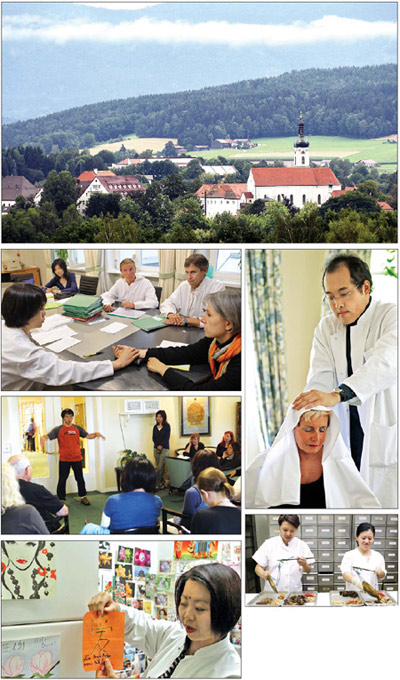Flying the tcm flag

A small border town is home to Europe's flagship clinic for traditional Chinese medicine.
Koetzting, a small mountain town of about 7,000 residents in Bavaria, southeast Germany, has become a household name in the past two decades, not only for its picturesque landscape but also for its clinic offering traditional Chinese medicine (TCM).
TCM-Klinik Bad Koetzting is Germany's first TCM clinic and claims to have cured more than 25,000 German patients, applying a combination of TCM and Western medicine, according to Stefan Hager, its medical director.
A joint Chinese and German medical team has had encouraging success with treating migraines, dizziness, chronic bronchitis and asthma.
Besides Chinese herbs, external traditional Chinese methods such as acupuncture, moxibustion, which uses burning moxa sticks or dried mugwort herbs to heat acupuncture points, tuina massage and qigong, or focused breathing, to provide sufferers with a holistic treatment, says Su Huiping, a Chinese TCM doctor with the clinic.
"TCM calls for a comprehensive analysis of the patient," Su says. "So treatment is tailored to the diagnosis, which gives TCM an advantage in curing chronic underlying diseases."
The clinic, which marked the 20th anniversary of its founding on July 22, was established jointly by the Beijing University of Chinese Medicine (BUCM), its affiliate Dongzhimen Hospital, and German Staudinger GmbH, in 1991.
Anton Staudinger, the late owner of Staudinger GmbH, was impressed by the qigong treatment he received for a cold while in Beijing on a business trip in the late 1980s.
The Koetzting native then opened training classes on qigong, massage and acupuncture for German doctors, by Chinese professionals from BUCM, for three months in his hometown in 1990.
Although few doctors joined, Staudinger persisted and developed the training school into the clinic.
In two decades, the clinic has become the flagship TCM clinic in Europe, and is the only one that is recognized by state health insurers.
However, in the beginning, TCM treatments were intensely questioned by Western medical practitioners.
"Traditional Chinese treatments depend on doctors' experience, which was deemed to be unscientific (by Western doctors)," says Sun Jingli, who worked as interpreter at the clinic.
He says their doubts were cleared only when there were positive outcomes that won the trust of the public.
"Over and again, we doctors, like our patients, are overwhelmed and encouraged by TCM's 'magical efficiency'," Hager says, showing a folder filled with notes of gratitude from cured patients.
The clinic, Sun says, has always been subject to strict supervision.
Each kind of herb is put through a series of rigorous tests conducted not only by German Customs but also the Pharmacy Institute of the University of Munich. Medicines derived from endangered animals or plants are subject to more stringent controls, he says.
The clinic also helps popularize TCM.
Training is offered to German doctors from across the country. The hospital also cooperates with universities in both countries on research. Its study on headache treatment, sponsored by the German government, has been published in The Lancet, one of the world's leading medical journals.
In 2008, the hospital was awarded the International Award of Contribution to Chinese Medicine by the World Federation of Chinese Medicine Societies.


















